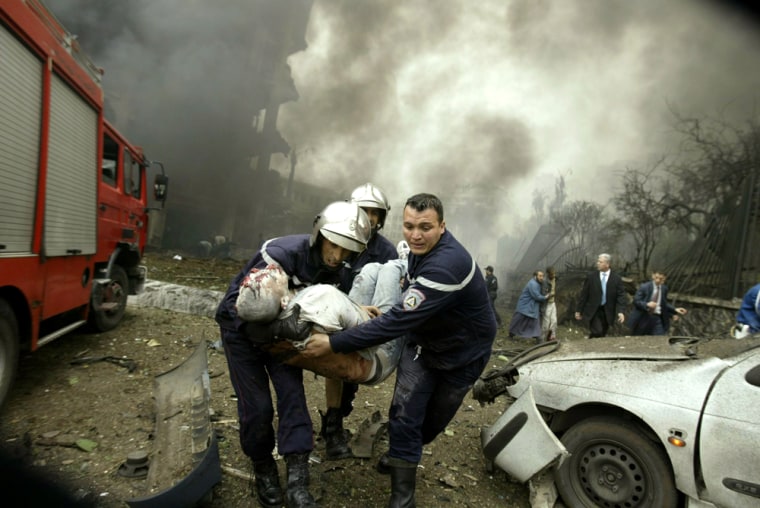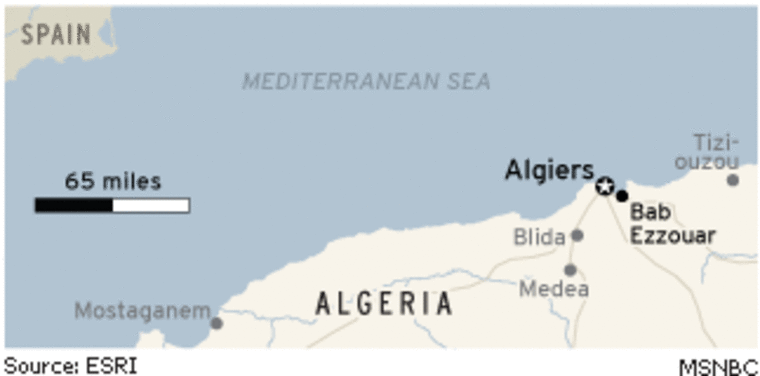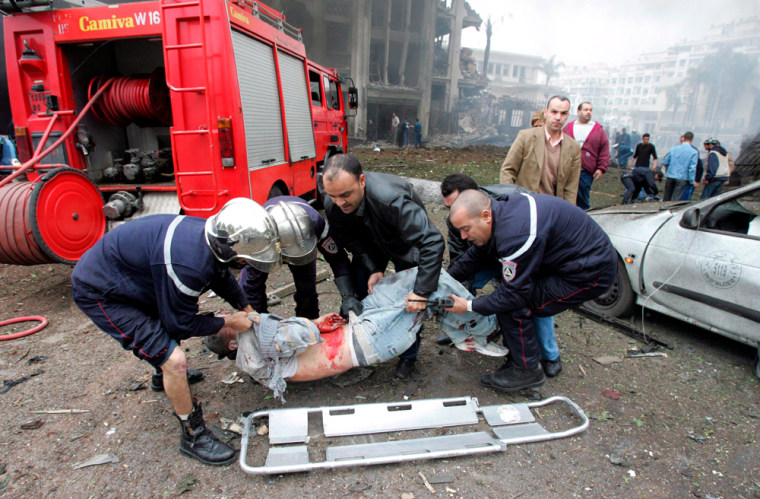A series of deadly attacks Wednesday in Algeria were a devastating setback for the North African nation’s efforts to close the chapter on its Islamic insurgency that has claimed 200,000 lives.
With al-Qaida's claim of responsibility for the blasts that left at least 23 people dead and 160 wounded, some fear the years of unrest in Algeria — and North Africa in general — have returned.
U.S. intelligence officials told MSNBC they were investigating any possible connection between the attacks in Algiers and Tuesday's bomb explosions in Casablanca, Morocco, where three suspected suicide bombers blew themselves up as police closed in and a fourth was killed in a shootout.
The officials fear that the two attacks may be part of a planned wave of violence against government facilities across North Africa.
But Moroccan investigators have not uncovered links between the bombings, but "we don't rule it out," said Moroccan Interior Minister Chakib Benmoussa on Wednesday in Casablanca.
At a news conference, he said the timing of the attacks was possibly coincidental. "We don't rule it out, but we have established no link," he said.
‘The fear is coming back’
For some Algerians, the crucial link is between the present and the past.
Fayza Kebdi, a lawyer who works in an office opposite the government building in Algiers, said an explosion on Wednesday, one of two that shattered calm in the Algerian capital about 10:45 a.m. local time, broke windows and blew her husband clear across the room.
“We thought the years of terrorism were over,” she said. “We thought that everything was back to normal. But now, the fear is coming back.”
“The fear” refers to the result of violence tied to an insurgency has left an estimated 200,000 dead — civilians, soldiers and Islamic fighters — according to the government.
After years of relative calm, the al-Qaida affiliate operating in Algeria has recently waged several smaller attacks in the oil- and gas-rich nation.
In Wednesday's attacks, bombs heavily damaged the prime minister’s office and a police station, the country’s official news agency said.
‘Cowardly, criminal terrorist act’
Prime Minister Abdelaziz Belkhadem, who was unhurt, called the attack a “cowardly, criminal terrorist act” as he spoke to reporters outside his wrecked offices.
According to Arab broadcaster Al-Jazeera, a spokesman for al-Qaida in Islamic North Africa claimed responsibility for the attacks, saying they were carried out by three suicide bombers in trucks packed with explosives.
“We won’t rest until every inch of Islamic land is liberated from foreign forces,” the spokesman said in a recording of the phone call played on Al-Jazeera.
Portraits before martyrdom
On an Islamic militant Web site, the group showed pictures of the three suicide bombers who allegedly carried out the attack, codenamed the “Badr Raid,” after a famed 7th century battle by the Prophet Muhammad and the first Muslims against his opponents, according to Al-Jazeera and the SITE Institute, a U.S. group that monitors militants’ messages.

In the photos, provided by the SITE Institute, each bomber — identified as Muadh bin Jabal, al-Zubair Abu Sajda and Abu Dajjana — was shown sitting with automatic rifles propped on the wall on either side of him.
Abu Sajda and Abu Dajjana had green scarves covering their faces, showing only their eyes. Abu Sajda and bin Jabal were wearing explosive vests.
Latest attempt on PM's life
U.S. officials say Wednesday's attack was aimed at killing Belkhadem, and as such is the latest in a series of assassination plots, attempts and actual successes carried out by al-Qaida going back to the mid 1990s.
If confirmed, Wednesday's attack would be the fifth time an al-Qaida-linked group has carried out an assassination attempt on a head of state, targeting the presidents or prime ministers of Pakistan (twice in 2003), Egypt (in 1995), Uzbekistan (in 1999) and now Algeria, according to MSNBC's Robert Windrem.
Belkhadem declined to say how many had been killed or wounded in Wednesday's attacks. The official APS agency said at least 23 people were killed and 160 wounded in the two attacks, but gave no breakdown. The other bombing targeted the police station of Bab Ezzouar, east of the capital, Algiers, on the road to its airport.
Witnesses said at least one of the attacks appeared to have been a car bomb.
A charred, wrecked car lay on the pavement about 98 feet from the gates of the government building — a modern white, block-like high-rise that also houses the Interior Ministry.
“At first I thought it was an earthquake,” said lawyer Tahar bin Taleb. “My wife called me a few moments later crying and shouting. I ran home to find all the mirrors and windows in the house were shattered.”
Dozens of ambulances converged on the upscale residential neighborhood as thousands of people poured on to the streets and survivors were led from the building.
Medics carried the bloodied and burned victims in their arms and on stretchers from the government palace.
Leila Aissaoui, 25, stood crying near the government palace.
“I thought explosions in Algiers were over,” she said. “I made a big mistake and I can’t accept this.”
France sends condolences
“I am horrified and indignant after the attacks which have just struck Algiers,” French Foreign Minister Philippe Douste-Blazy said in a statement. “I convey my sincerest condolences to the victims’ families and assure the Algerian authorities of our full solidarity in their fight against terrorism.”
France ruled Algeria before independence in 1962.

Police cordoned off stairs leading up to the government building with orange police tape, and paramedics raced up the steps with stretchers. Paramedics escorted a man with blood on his head into an ambulance. Another woman, looking dazed and in tears, was checked for head injuries.
The explosion at about 10:45 local time caused windows to rattle at least a half-mile away. Few details were immediately available about the other attack east of the capital.
Report: U.S. investigating links to Morocco blasts
On Tuesday in neighboring Morocco, police surrounded a building in Casablanca where four terrorism suspects were holed up, causing three to flee and blow themselves up with explosives. The fourth was shot to death by a police sharpshooter as he apparently tried to detonate his bomb. A police officer was killed and 10 people, including a young child and a policeman, suffered injuries.
Since five suicide bombings that killed 45 people in Morocco in May 2003, police have pursued an unprecedented crackdown on suspected militants, arresting thousands of people, including some accused of working with al-Qaida and its affiliates to plot attacks in Morocco and abroad.
The group claiming responsibility was founded last year and includes Islamic militant groups in Morocco, Algeria, Tunisia and Libya.
U.S. intelligence officials told MSNBC they were investigating any possible connection between the bomb explosions in Morocco and Wednesday's attacks in Algiers.
Insurgency with a long history
Algeria’s insurgency broke out in 1992, after the army canceled legislative elections that an Islamic party appeared set to win.
Since then, Algeria’s military led a crackdown on militants hiding out in the country’s brush and mountains, while the government tried to reconcile the nation with several amnesty offers to militants willing to turn in their weapons.
Belkhadem expressed bitterness at insurgents who refused the amnesty offers.
“The Algerian people stretched out a hand to them, and they respond with a terrorist act,” he said.
Large-scale violence died down in the late 1990s, but skirmishes have surged in recent months as an al-Qaida affiliate carried out a deadly and carefully planned series of bomb attacks. Several targeted foreign workers.
A March 3 bombing of a bus carrying workers for a Russian company killed a Russian engineer and three Algerians. A December attack near Algiers and targeting a bus carrying foreign employees of an affiliate of Halliburton killed an Algerian and a Lebanese citizen.
